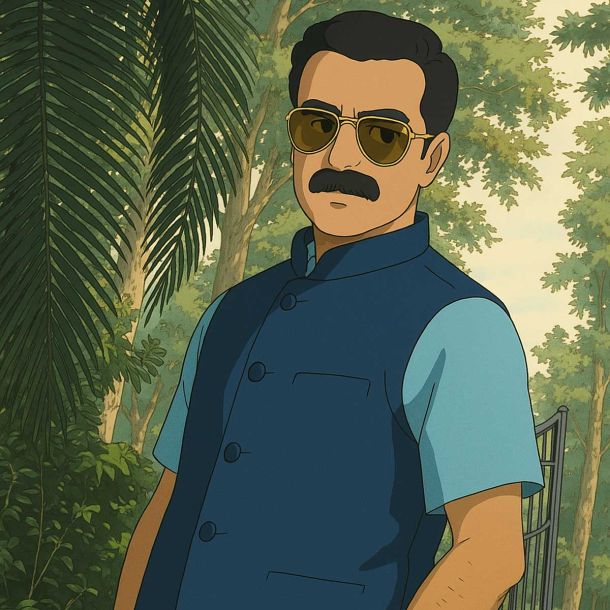More Coverage
Twitter Coverage
Satyaagrah
Written on
Satyaagrah
Written on
Satyaagrah
Written on
Satyaagrah
Written on
Satyaagrah
Written on
Join Satyaagrah Social Media
Unsung Heroine Pritilata Waddedar, Who Shook The British Raj at the age of 21
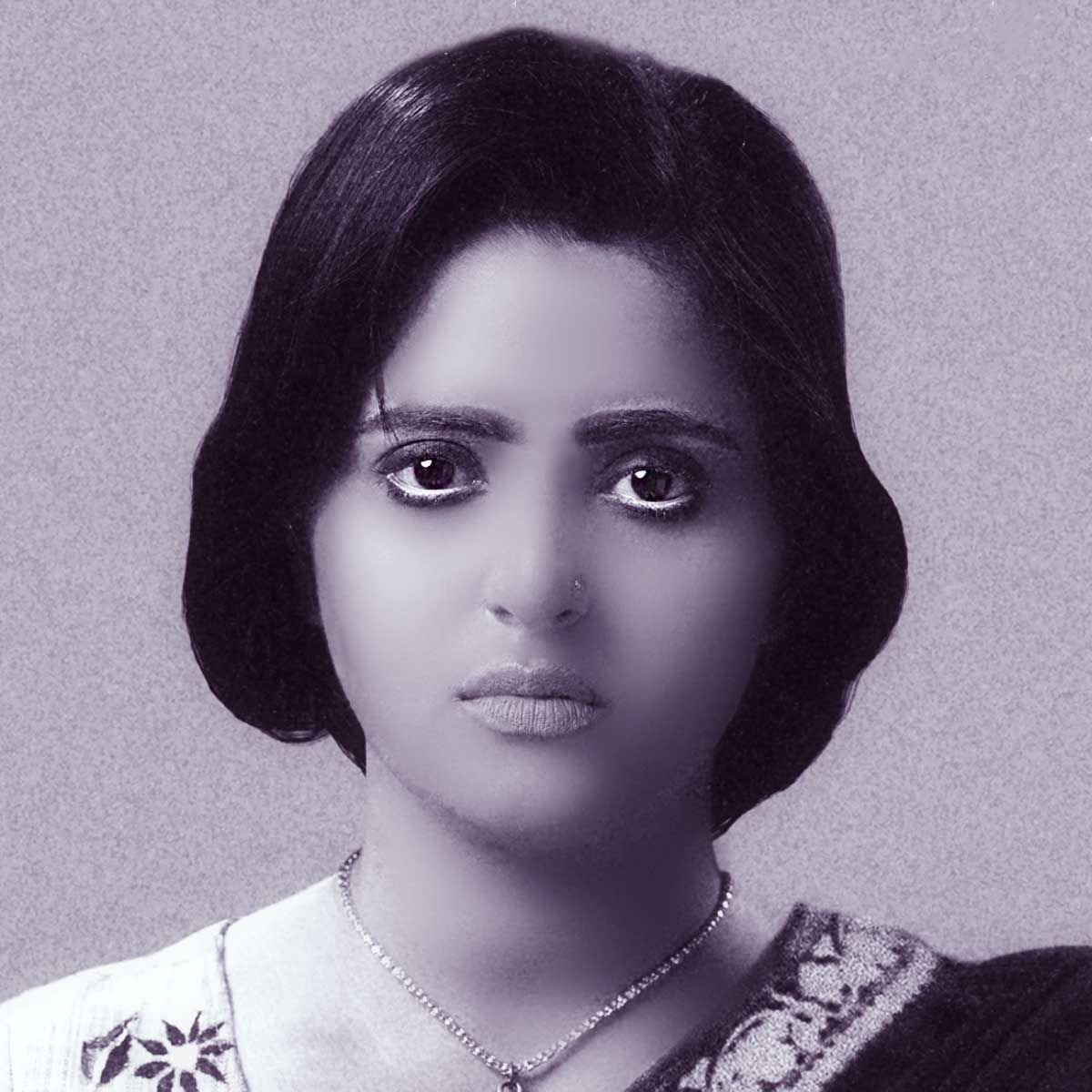
History is replete with examples of valour, grit and determination exhibited by India’s freedom fighters against the British Raj. While some of them featured prominently in history textbooks, others never received their deserved recognition. Even freedom fighters, who put down their lives for their motherland, also disappeared into oblivion. Such has been the case of Bengal’s first female martyr, Pritilata Waddedar. She made the supreme sacrifice on this day (September 23), 89 years ago.
At a time when women were not allowed into the internal meetings of the armed revolutionary group “Jugantar” in Bengal, Pritilata Waddedar not only participated in armed attacks against the oppressors but also led them. After the failure of the raid, Waddedar consumed cyanide, preferring death over capture by the British, setting a fiery example and inspiring young girls and women throughout the Eastern part of India with her bravery and dedication towards freeing India from colonial rule.
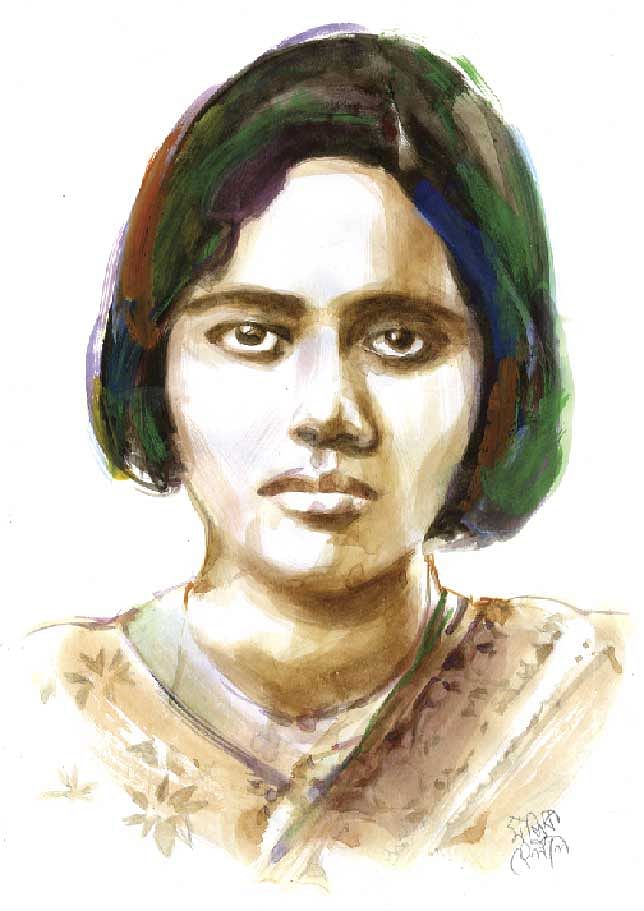 |
“Long Live Revolution”, “An appeal to sisters… Women today have taken the firm resolution that they will not remain in the background. For the freedom of their motherland, they are willing to stand side by side with their brothers in every action, however hard or fearful it may be… I boldly declare myself as a revolutionary.” Pamphlets with these handwritten words on them were discovered tucked in the shirt of Pritilata Waddedar when the police found her body outside the Pahartali European Club.
Her name might be buried under the dust of time, but if ever it pops up, everyone remembers her as the iron lady of Bengal. After telling you about the story of Jhalkari Bai, let's take our series of India's unsung woman heroes ahead. Introducing Pritilata Waddedar.
Pritilata Waddedar's sacrifice cannot be ignored. She was among the initial lot of revolutionaries who picked up arms against the British Raj and was the first woman in Bengal to do so. Having died at the age of 21, her story is fit for a film's screenplay.
Pritilata was born to a middle-class family on 5 May 1911 in Dhalghat village in Patiya upazila of Chittagong (now in Bangladesh). Her parents were Jagabandhu Waddedar (father) and Pratibhamayi Devi (mother). Jagabandhu was a clerk in the Chittagong Municipality. Her mother Pratibhamayi Devi was a housewife. The couple had six children– Madhusduan, Pritilata, Kanaklata, Shantilata, Ashalata and Santosh. Pritilata was nicknamed Rani. Waddedar was a title conferred to an ancestor of the family who originally had the surname Dasgupta.
Jagabandhu tried to arrange best possible education for their children. He got Pritilata admitted in Dr. Khastagir Government Girls' School of Chittagong. Pritilata was a meritorious student. A teacher in the school, whom students affectionately used called Usha Di, used stories of Rani Lakshmibai to inspire nationalism in her students. Kalpana Datta, a classmate of Pritilata, writes in the biography Chittagong Armoury raiders– "We had no clear idea in our school days about our future. Then the Rani of Jhansi fired our imagination with her example. Sometimes we used to think of ourselves as fearless...".
She passed out of Dr. Khastagir Government Girls' School in 1928 and in 1929, got admitted to the Eden College, Dhaka. In the Intermediate examinations, she stood first among all students who appeared in that year's examination from the Dhaka Board.
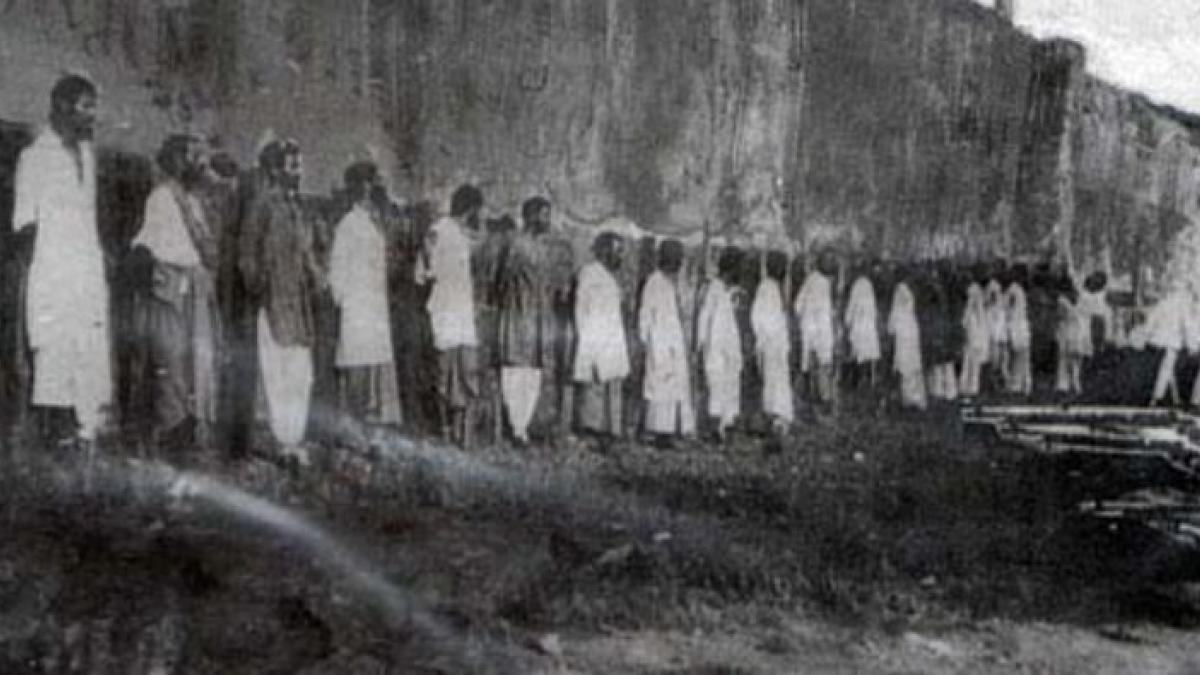 91 Years Ago, Chittagong Armoury Raid Shook the British Empire |
When she was a student of class VIII, she witnessed Masterda Surya Sen being imprisoned by the British Police on the charge of looting Railway money. On witnessing the oppression unleashed by the British Police on the revolutionary activists, her patriotic spirit rose up. Gradually she started collecting books on revolutionary philosophy and biographies of great revolutionary leaders.
As a student in Eden College, she joined and partook in various social activities after having joined the group, “Stree Sangha” under Leela Nag. She joined the Sangha under the banner of ‘Dipali Sangha’ which was a secret revolutionary group comprising of women. She also stood first in the intermediate Board exam that year. Arts and literature being her favorite subjects, Pritilata went to Calcutta to pursue higher studies from Bethune College and after two years, graduated in Philosophy with a distinction as well. However, her degree was withheld by the British in the administration of Calcutta University along with fellow revolutionary, Bina Das.
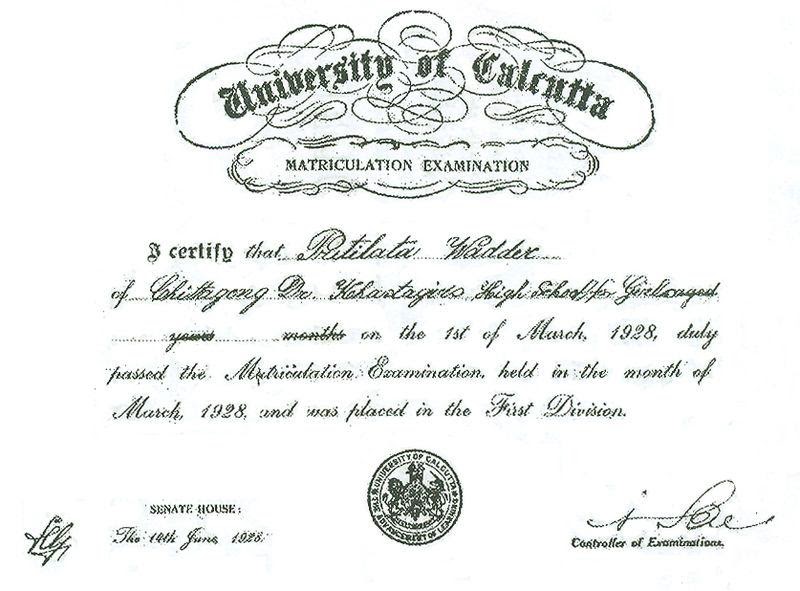 |
Pritilata Waddedar and her entry into revolutionary organisations
After completing her Bachelors degree, she returned to Chittagong and became the Headmistress of a high school named Nandankaran Aparnacharan School. During her Intermediate at Eden College, Pritilata began taking a keen interest in revolutionary activities and had joined freedom fighter Lila Nag in Dipali Sangha. Bengal in the 1930s had shunned Gandhi’s idea of ‘non-violence.’ Revolutionary organisations, espousing armed struggle against the British regime, had gained centrestage in Bengal.
Pritilata Waddedar was introduced to Masterda Surya Sen and Nirmal Sen, by one of her revolutionary brothers. It was rare for women in those days to be accepted in revolutionary groups. Pritalata Waddedar was not only accepted but was trained in fighting and leading attacks. Her inclusion into the Dhalghat camp of the Jugantar group, run by Surya Sen himself, drew the ire of fellow revolutionary leader Binod Bihari Chowdhury. However, Sen understood that it would be easier for a woman to transport arms without raising suspicion.
Under Masterda, Pritilata was not just a passive arms transporter but actively trained in the martial arts that the revolutionaries of Bengal were trained in at that time. She was herself trained in “lathi khela” and gun fighting and trained other girls to take up arms against the colonial rulers too.
By 1930, Surya Sen, Waddedar and more than 60 others set out to capture the two main armouries in Chittagong, take hostages from the European Club, and cut off rail and communications contact with Calcutta. Despite failing to locate the British stockpile of ammunition, the revolutionaries managed to cut telephone and telegraph wires and disrupt the rail network and even captured the Reserve Police Line.
She also supplied explosives, wrote nationalist pamphlets and had earned a spot at the “Bengal’s Most Wanted List” by the age of 21.
Inspiration from Ramkrishna Biswas
Besides Surya Sen, she was also inspired by revolutionary Ramakrishna Biswas. He was serving prison time in Alipore Central jail for killing rail officer Tarini Mukherjee mistakenly, although his target was the General Inspector of Police (Chittagong) Craig.
Surya Sen and his revolutionary group decided to kill Mr. Craig, Inspector General of Chittagong. Ramakrishna Biswas and Kalipada Chakravarty were assigned for this task. But they mistakenly killed SP of Chandpur and Traini Mukherjee instead of Craig. Ramakrishna Biswas and Kalipada Chakravarty were arrested on 2 December 1931. After the trial Biswas was ordered to be hanged till death and Chakravarty to be exiled to Cellular Jail.
The family and friends lacked the amount of money required to travel to Chittagong to Alipore Jail of Calcutta. Since at that time Pritilata was staying in Kolkata, she was asked to go to Alipore Jail and meet Ramkrishna Biswas.
Pritilata Waddedar was firm in her resolve, willing to die for the motherland
Owing to her deception skills, she was able to meet Biswas in jail about 40 times without raising any suspicion. Pritilata Waddedar easily passed off as his elder sister. When Biswas was hanged to death in 1931 by the British authorities, the incident fuelled her revolutionary ideas even more. Freedom fighter Kalpana Dutta shared her experience with Pritilata Waddedar in her book, ‘Chittagong Armoury raiders : Reminiscences.’
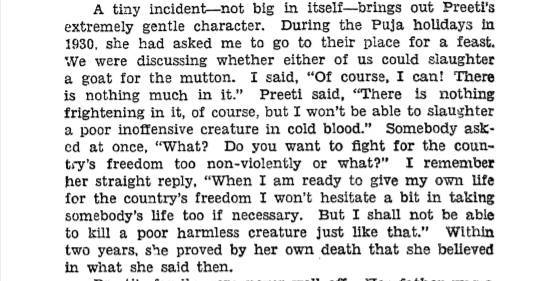 Excerpt of the book |
She narrated how Waddedar was reluctant to sacrifice a goat on Durga Puja, thereby making fellow revolutionaries question her ability at armed struggle. “Do you want to fight for the country’s freedom too non-violently or what?”, Pritilata was asked. She replied, “When I am ready to give my own life for the country’s freedom, I won’t hesitate a bit in taking somebody’s life too if necessary.” The incident went on to show the resolve and the fire of patriotism that was burning in her heart.
The raid on Pahartali European Club
Pritilata Waddedar had a narrow escape when she went to meet Surya Sen on June 13, 1932. His hideout was surrounded by the British troops, leading to a confrontation. Although some revolutionaries were martyred, the duo managed to escape. The British authorities got alerted and they put her up on the list of ‘most wanted’ revolutionaries. Sen instructed Pritilata to remain underground for sometime while the group hatched other plans. Masterda wanted to target a racist, white supremacist club named ‘Pahartali European Club’. The notice board outside the club read, ‘Dogs and Indians not allowed.’
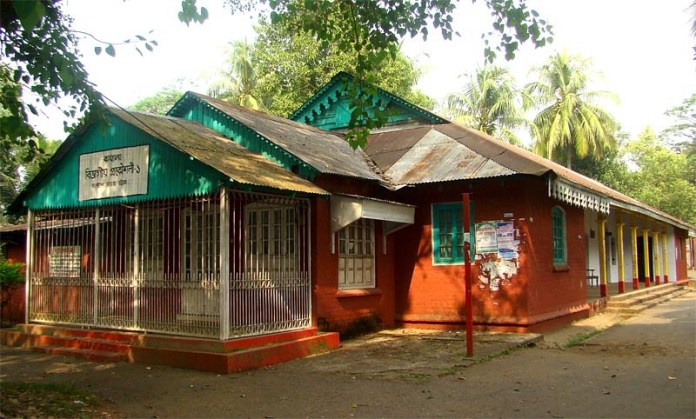 The torched ‘Pahartali European Club’, image via Wikimedia |
Surya Sen decided to appoint a woman leader for this mission. Kapana Datta was arrested seven days before the event. Because of this, Pritilata was assigned the leadership of the attack.
The task was to conduct a raid and destroy the club on the fateful day of September 23, 1932. Pritilata went to Kotowali Sea Side for arms training and made the plan of their attack there. The members of the group were given potassium cyanide and were told to swallow it if they were caught.
On the day of the attack, Pritilata dressed herself as a Punjabi male. Her associates Kalishankar Dey, Bireshwar Roy, Prafulla Das, Shanti Chakraborty wore dhoti and shirt. Mahendra Chowdhury, Sushil Dey and Panna Sen wore lungi and shirt.
They reached the club at around 10:45 PM and attacked the club. There were around 40 people inside the club then. The revolutionaries divided themselves into three separate groups for the attack. In the club, a few police officers who had revolvers started shooting. Pritilata incurred a single bullet wound. According to the police report, in this attack, one woman with a surname of Sullivan died and four men and seven women were injured.
Death
An injured Pritilata was trapped by the British police. In order to avoid arrest, she swallowed cyanide and committed suicide. On the next day police found her body and identified her. On searching her dead body police found a few leaflets, photograph of Ramkrishna Biswas, bullets, whistle and the draft of their plan of attack. After the post-mortem it was found that the bullet injury was not very serious and cyanide was the reason of her death.
The chief secretary of Bengal sent a report to British authorities in London. In the report it was written–
Pritilata had been closely associated with, if not actually the mistress of, the terrorist Biswas who was hanged for the murder of Inspector Tarini Mukherjee, and some reports indicate that she was the wife of Nirmal Sen who was killed while attempting to evade arrest of Dhalghat, where Captain Cameron fell.
Her martyrdom at the tender age of 21 years sent waves of inspiration for other revolutionaries in Bengal. Kalpana Dutta recounted in her book how Surya Sen was against the idea of handing potassium cyanide capsules to Pritilata Waddedar.
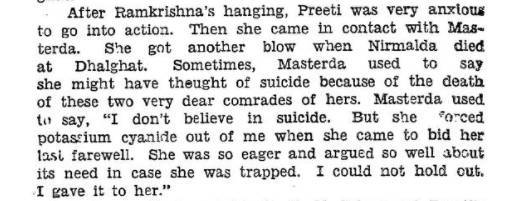 Excerpt from book |
“I don’t believe in suicide. But she forced potassium cyanide out of me when she came to bid her last farewell. She was so eager and argued so well about its need in case she was trapped. I could not hold out. I gave it to her,” Masterda narrated. The participation of Pritilata Wadedar and her eventual martyrdom, therefore, became crucial as the armed revolution was largely a men’s affair.
 Excerpt from book |
Through her example, she sent out a message to the women of Bengal that they can march shoulder to shoulder with men in liberating the country from the British. In her book, Kalpana Dutta recounted how the parents of Pritilata Waddedar were devasted at her loss. “People of Chittagong have not forgotten Preeti or her great sacrifice. They point out her father to any stranger and say, ‘He is the father of the first girl who gave her life for our country,” she concluded.
Legacy
Waddedar’s attack on the club as well as her death at such a tender age ignited a fire in the entire Eastern side of India. Her bravery and audacity at a time when women were still kept in the “andarmahal” and not thought fit enough to be educated or participate in political protests, astounded everyone. More and more women were inspired, motivated and awed by her struggle and fight against the oppressive rule of the British.
Bangladeshi writer Selina Hossain calls Pritilata an ideal for every woman. A trust named Birkannya Pritilata Trust (Brave lady Pritilata Trust) has been founded in her memory. Pritilata's birthday is celebrated by the trust in different places of Bangladesh and India every year. The trust considers her to be "a beacon of light for women". The last end of Sahid Abdus Sabur Road to Mukunda Ram Hat of Boalkhali upazila in Chittagong has been named as Pritilata Waddedar Road. In 2012, a bronze sculpture of Pritilata Waddedar and Suya Sen has been planned to be installed in front of Pahartali Railway School, adjacent to the historical European Club. A “Pritilata Shaheed Minar” has also been constructed to commemorate her sacrifice for the country.
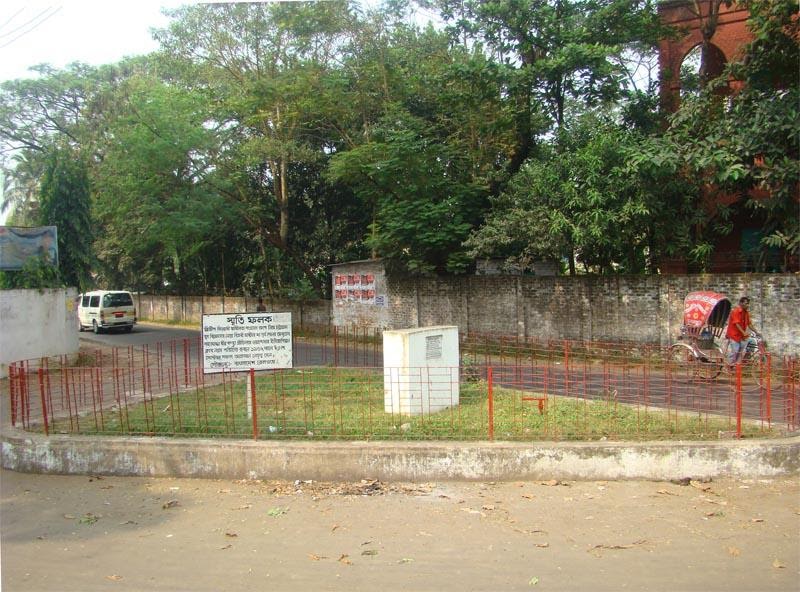 The place where Pritilata committed suicide |
In popular media
- 2010 Bollywood movie Khelein Hum Jee Jaan Sey was based on Chittagong Uprising where Vishakha Singh played the character of Pritilata.
 |
- In 2012, the Hindi film Chittagong was released based on the uprising. Vega Tamotia played the role of Waddedar.
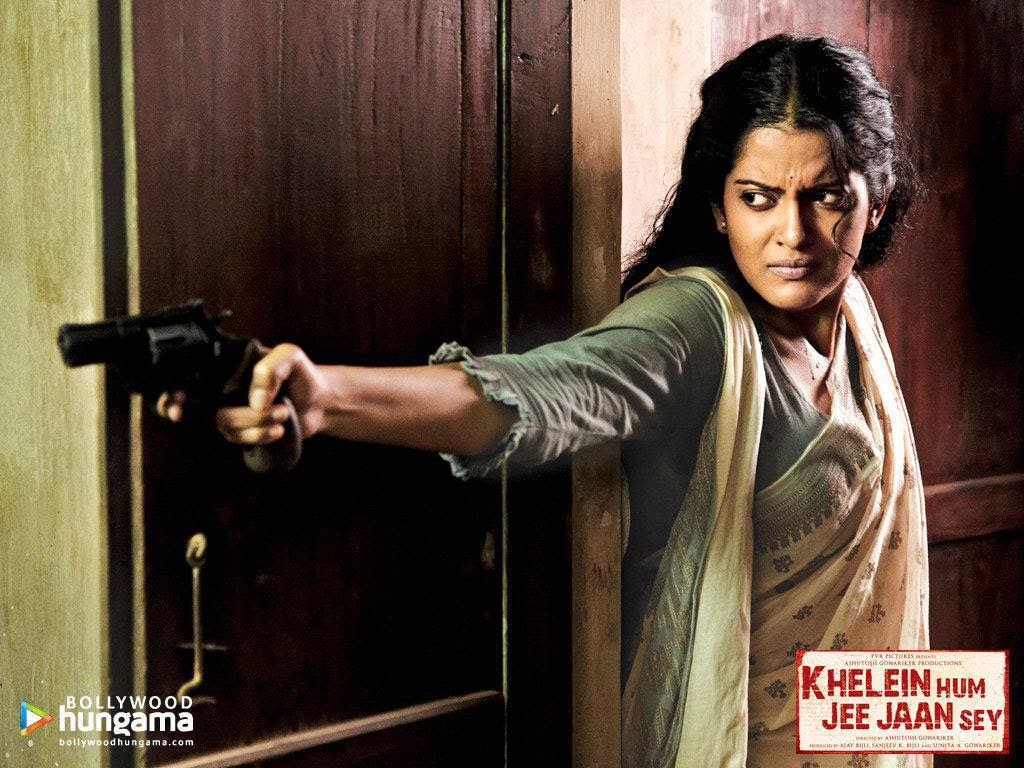 |
Pritilata Waddedar stands out as a beacon in the field of women revolutionaries who took up arms against the British rule and torture that was meted out every day. Conflicting with Gandhi’s ideology of non-violence, the Anushilan Samiti was founded as a “suburban bodybuilding society” but soon became an organization based on nationalist ideas as propounded by Swami Vivekananda and Bankim Chandra Chattopadhyay which were hugely read in Bengal during that time.
Anushilan Samiti was one of such many secret societies which were founded in Bengal during that time to plan and carry out armed attacks on the agents of the British government on a local level and soon leading to state level. At such a point of time, Aurobindo Ghose wrote nationalist publications like ‘Jugantar’ and ‘Bande Mataram’. Many men from the middle and lower classes came up to join these societies and participated in these attacks. They trained together and worked to chase the British out of India.
In such a male-dominated community of armed revolutionaries, the activities of Pritilata Waddedar along with her contemporaries, Kalpana Datta, Santi Ghose and Suniti Choudhury are often ignored by history textbooks and the dominant narrative that runs in Bengali society about these armed revolutionaries. It would be a grave injustice to overlook the part Pritilata played at this juncture of time. Not only at that time but also the everlasting impact her actions would have on the generations of women to come, inspiring them to get out of the patriarchal society that confined them to their houses, to come out and actively break the gender roles that prevailed in society that set aside women as the weaker sex.
According to Ash Sarkar, “For Pritilata Waddedar and other female participants in the freedom struggle, armed anticolonial insurrection was the only means by which women could achieve their liberation.” In what transpired to be her final documented words, Waddedar wrote ,“I earnestly hope that my sisters will no more think themselves weaker and will get themselves ready to face all dangers and difficulties and join the revolutionary movement in their thousands.”
Like her contemporary, Bina Das, Waddedar too had been denied her graduation degree by the British authorities of Bethune College under Calcutta University. In March 2012, almost eight decades after her death, the University of Calcutta posthumously awarded Waddedar her pending Bachelor of Arts degree with Distinction for the year 1932. On her graduation certificate, Waddedar’s name is mentioned with a misspelling, ‘Pritilata Waddar’, perhaps an indication of how her name was recorded in university records.
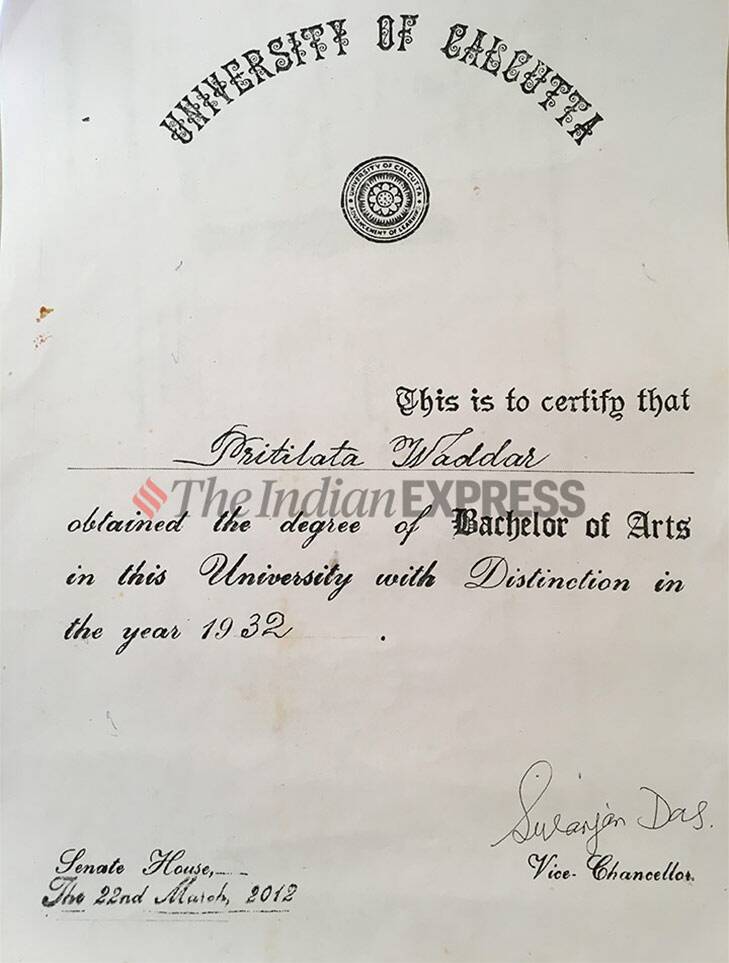 In March 2012, Calcutta University posthumously awarded Pritilata Waddedar her pending Bachelor of Arts degree with distinction for the year 1932, that the British administrative authorities had withheld from her. (Express Photo by Neha Banka) |
Dr Soumitra Sarkar, Librarian of Calcutta University, who oversees university archives told indianexpress.com that he did not have much information concerning why this may have occurred. A copy of Waddedar’s graduation certificate and marksheets were provided to the Birkanya Pritilata Trust in May 2018, based in Waddedar’s native village, Dhalghat, Patiya, Chittagong, established in her memory.
References:
Dutt, K. (1945). Chittagong Armoury Raiders: Reminiscences. India: People’s Publishing House
wikidata.org
military-history.fandom.com
feminisminindia.com - Sukanya Bhattacharya
opindia.com - Dibakar Dutta
 Support Us
Support Us
Satyagraha was born from the heart of our land, with an undying aim to unveil the true essence of Bharat. It seeks to illuminate the hidden tales of our valiant freedom fighters and the rich chronicles that haven't yet sung their complete melody in the mainstream.
While platforms like NDTV and 'The Wire' effortlessly garner funds under the banner of safeguarding democracy, we at Satyagraha walk a different path. Our strength and resonance come from you. In this journey to weave a stronger Bharat, every little contribution amplifies our voice. Let's come together, contribute as you can, and champion the true spirit of our nation.
 |  |  |
| ICICI Bank of Satyaagrah | Razorpay Bank of Satyaagrah | PayPal Bank of Satyaagrah - For International Payments |
If all above doesn't work, then try the LINK below:
Please share the article on other platforms
DISCLAIMER: The author is solely responsible for the views expressed in this article. The author carries the responsibility for citing and/or licensing of images utilized within the text. The website also frequently uses non-commercial images for representational purposes only in line with the article. We are not responsible for the authenticity of such images. If some images have a copyright issue, we request the person/entity to contact us at This email address is being protected from spambots. You need JavaScript enabled to view it. and we will take the necessary actions to resolve the issue.
Related Articles
- 21-yr-old girl Bina Das shot Bengal Governor in her convocation programme at Calcutta University, got Padma Shri but died in penury
- Kartar Singh Sarabha - The Freedom fighter who was Hanged at the age of 19 and inspired Bhagat Singh
- Tirot Singh: An Unsung Hero of the Khasi Tribe who destroyed British with his skill at Guerrilla Warfare
- Freedom struggle of Gurjars against Britishers at Koonja in 1824: 100s of Gurjars Martyred and 100s Hung in Single Tree
- Dangers of losing our identity: Guru Tegh Bahadur forgotten and Aurangzeb being glorified
- Our first true war of independence lie forgotten within the fog of time and tomes of propaganda: Sanyasi Rebellion, when "renouncers of the material world" lead peasants in revolt against British and fundamentalist islamic clans
- Jhalkaribai: The Indian Rebellion Of 1857 Who Took on British Forces Disguised as Laxmibai
- 16 year old freedom fighter Shivdevi Tomar, who killed 17 Britishers and wounded many
- A Different 9/11: How Vivekananda Won Americans’ Hearts and Minds
- Santi Ghosh and Suniti Choudhury: Two Teenage Freedom Fighters Assassinated British Magistrate
- An Artisan Heritage Crafts Village: Indigenous Sustainability of Raghurajpur
- Birsa Munda: The tribal folk hero who was God to his people by the age of 25
- Rana Sanga, the symbol of bravery who defeated Sultan Ibrahim Lodhi and fought Muslim Terrorists for Hindu Existence
- How Chhatrapati Shivaji Maharaj was establishing Hindu Samrajya by concluding centuries of Islamic oppression - Historian GB Mehandale destroys secular propaganda against Hindu Samrajya Divas
- अथ रामचरितमानस प्रकाशन कथा: गीता प्रेस, गोरखपुर ने 1938 से रामचरितमानस का प्रकाशन शुरू किया
